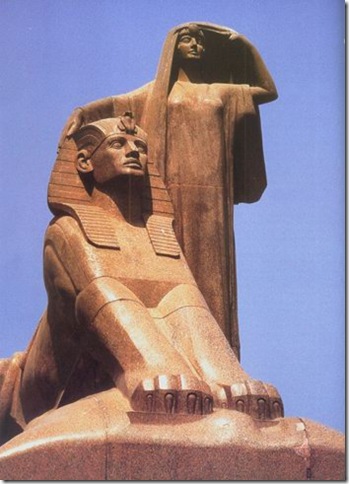Static, monumental, lifeless, this piece is the diametric opposite of the vital sculpture of the likes of Rodin or Michelangelo or Bernini, in whose work the very marble breathes life -- indeed, it has more akin to the stodgy sculpture so beloved of Soviet artists. I'm not posting it here because I like it, but because it is nonetheless enormously symbolic in representing modern Egypt and its nationalistic 'renaissance.' In that sense, it is good art: it successfully concretises the messy abstraction that is modern Egyptian nationalism, which is no doubt why historian Scott Powell chose it use to illustrate his post-lecture thoughts on Egypt.
Completed from 1919 to 1928 in the wake of World War I and Egypt's rising tide of nationalism -- the only sense in which it can be said that Egypt has ever undergone a renaissance. Scott Powell argues that Egypt's defining characteristic is its several millennia old “sense of nationhood,”
an implicit premise embedded in Egyptian thinking that extends back to its “glorious” pharaonic past, of which the ever present pyramids and temples [and mortuaries and funerary palaces] provide a constant reminder... Egypt’s sense of nationhood is a kind of subconscious estimate of the value of the people and their past which has been a major factor directing them to where they are today.
Let us not forget that the "glory" of Egypt's past was a culture that celebrated slavery and death the permanence that was death -- and an architecture that in its glorification of burial rites and death-worship was the perfect embodiment of these anti-values. If Mahmoud Mokhtar's art is both monumental and lifeless, that is because the "reawakening" it depicts is of a piece with this sentiment.
But while the nationalism of today's Egypt reveres the form of its past 'glories', it lacks the metaphysical base that was responsible for them. Since the death of Nasser, Egyptian nationalism's most vigorous standard bearer, Egypt's nationalism has withered in the face of the more explicit and integrated metaphysics and values of Islam, both of which are widely accepted by the Egyptian population.
Ironically (as a concrete symbol of the conflict between this nationalistic sense and the undercurrent of Islamism that directly challenges it), in the very year that Mokhtar's sculpture was completed in Cairo to express the incipient sense of nationalism in the Egyptian breast, a movement was founded in the same city to express the other-worldly metaphysics and death-worshipping values of Islam. That organisation was the Muslim Brotherhood, from whom many of al Qaeda's notions and luminaries are drawn.
The values of these two ideological forces have been in battle ever since -- the suppression of the Brotherhood and the murder of Nasser's successor Anwar Sadat by Muslim Brotherhood killers being two ready symbols of the conflict played out between the secular but disintegrating nationalism and the vigorous, violent and persistent Islamism that the brotherhood embodies.
This can be a conflict with only one victor. Scott Powell argues at his 'Powell History Recommends' blog that because nationalism is merely a set of disintegrated implicit notions whereas Islamism is an "all-encompassing and explicit system of ideas," it is therefore "only a matter of time before it takes over."
Egypt is thus a nation in flux, and on its way to somewhere worse. "Despite the constant use of force by the Mubarak regime to suppress the Muslim Brotherhood," notes Powell, "that Islamist organization remains the only organized political opposition in Egypt [as a recent day of angry protest was intended to demonstrate]. This matters because the country may be on the verge of economic collapse and widespread violence."
And this matters to us because Egypt is not only the source of one of the most virulent of Islamism's anti-western toxins, but because it has the potential to be the next Poland -- ie., "the next flashpoint that ignites an unexpected larger war, such as occurred in 1939."
NB: I recommend Scott's lecture course on The Islamist Entanglement as an excellent and enjoyable way to get a handle on the important events shaping up in and from the Middle East.

1 comment:
Now that you mention it, it really does have that "Russian Propoganda poster" look about it doesn't it!
Post a Comment